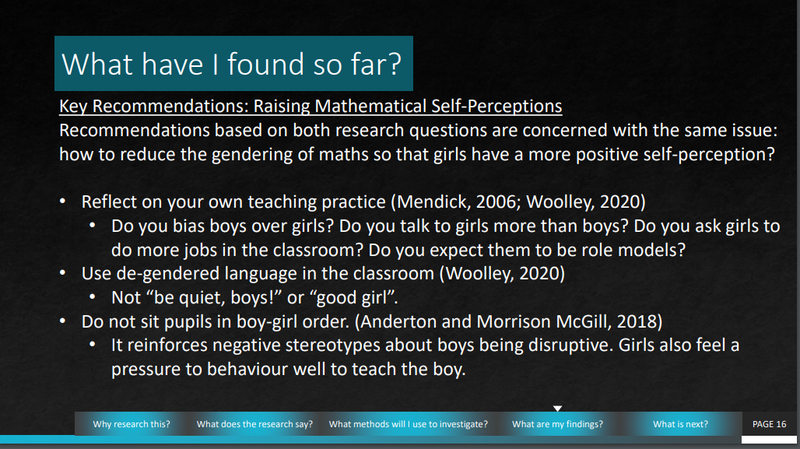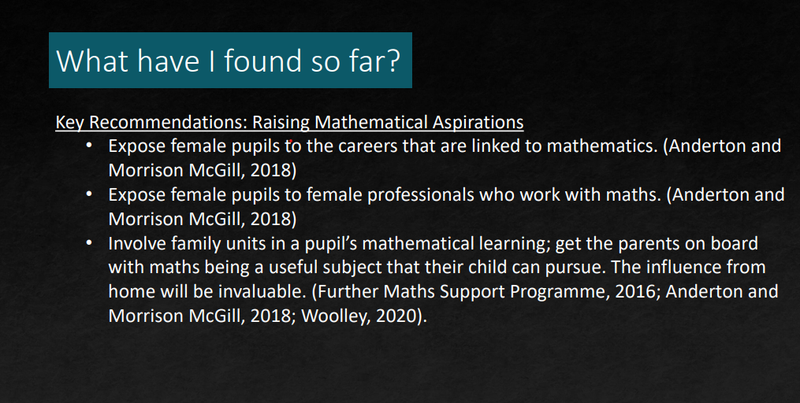Exploring the self-perceptions of mathematical ability and aspritions in high attaining Key Stage Four female pupils.
- Qualitative
- Secondary
- Focus group
- Mathematics
- Education and Language
- Perspectives
Since the Enlightenment, the notion of scientific rationality and abstraction has been closely associated with the male gender more so than the female. Mathematics is seen as a subject that deals with the abstract using rational logical methods of inquiry. Transitively, then in mathematics has become known as a subject more suited for males to pursue as a career. Societal stereotypes and narratives in a patriarchal society have propagated this association throughout history through the use of binary oppositions that privilege the personality traits commonly associated with the male gender. What effect, therefore, has this had on female pupils studying mathematics? This research explores the influences on the self-perceptions of mathematical ability of high attaining female pupils during their GCSE years of study. In my professional life as a teacher and through news reports on every GCSE results day, we find that female pupils are just as good as, if not better than, male pupils in GCSE subjects. However, when we look at a level participation, we find that a notable majority of mathematics students are males. What is happening to those high attaining girls so that they do well in GCSE mathematics, but decide not to pursue mathematics at A Level? As well as analysing and explaining how self-perceptions affect mathematical aspirations, we will also compare female self-perceptions with male self-perceptions of mathematical ability. This will allow us to evaluate the extent to which this dualistic opposition thinking from the Enlightenment still permeates contemporary societal thinking about mathematics attainment and aspirations. This research aims to answer two research questions: 1. How do high attaining female pupils perceive their own mathematical ability and aspirations? 2. What is the difference between self-perceptions of mathematical ability and aspirations in high attaining male and female pupils? Through the use of pupil questionnaires and pupil focus groups, the notion of gender socialisation, intersecting with GCSE mathematics lessons is analysed. How the different gender groups view this socialisation and the influence on their mathematical aspirations (or lack thereof) were evaluated to conclude whether archaic gender stereotypes about mathematics as being a ‘male subject’ is still affecting high attaining students.
The community I have chosen for my Dissemination of Impact presentation is the mathematics department at my school of employment. The reason I have chosen them is because my research is an exploration into the self perceptions of some of our pupils. Recent narratives in education have focused on white, working class boys or engage low attainers, however, as my research has shown, high attaining girls also need focusing on. The purpose of my research was to find out about the self perceptions of my high attaining class and why it was that they were not choosing to do A level maths in college. This was a problem, not just in my high attaining classes, but others too (as shown by the pupil questionnaires I conducted). Therefore, my findings and recommendations are extremely relev ant to
my mathematics colleagues in school, as they can then use my research to inform their own practice. By using the recommendations, and reflecting on the ideas that I have discussed, they can better their own teaching so that they can become a more feminist teacher. The effect of this should be that narratives in our school that exclude girls, or treat maths as a subject for boys, will be eradicated. Hence, high attaining girls have a more positive self perception of mathematical ability and feel empowered to take maths at A level if they so wish. If the department wish to implement my recommendations and use the issues I have raised to further reflect on our teaching practice and the way we talk about mathematics, then the effect should be a more inclusive classroom, where female (high attaining) pupils feel more open to the possibility of continuing with mathematics study post GCSE.


